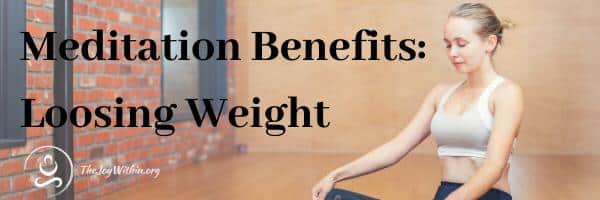Meditating has numerous benefits from the physical body to the emotional and mental bodies as well. Meditation gives you the gift of exploring yourself and taking a step back from habitual daily life in order to see yourself and your reality with clarity.
Byron Katie, author of Loving What Is: Four Questions That Will Change Your Life, says you are neither questioning your thoughts or believing them. Now how is it that meditation can help you lose weight?
Emotional Eating
People emotionally eat as a coping mechanism. If you look at it symbolically they may be trying to nourish or fill themselves by eating. This may be because they are lacking in nourishment in other aspects of their life so this leads them to overcompensate here.
Emotional eating is a distraction there’s no way around that. It can distract one from uncomfortable feelings, unacknowledged grief, or tasks they don’t want to confront. When we sit in meditation we begin to practice watching sensations and not attaching to them.
This viewpoint is a tool that can be used when uncomfortable feelings arise. By taking note and observing objectively rather than being overwhelmed or ruled by surfacing emotions.
Through a meditative state, you can decide how you would like to act rather than being controlled by your emotions. This tool helps when deciding what foods to eat as well, rather than making choices based on cravings you can become aware of what food would make you feel the best long term rather than immediate gratification.

Listening To The Body
When we meditate we are taking the time to allow our busy thoughts to settle. This will surface up any unresolved emotions we need to process. When we begin trying to lose weight while disregarding the reason it’s there, we basically patch up a hole with duck tape.
Our bodies speak to us through the state they are in. Louise Hay explains this in the book, Heal Your Body, she discusses how imbalances in the mental and emotional body manifest in the physical body.
Mindful Eating
Introducing mindfulness to your dining experience can immediately stop overeating. Commonly when we overeat we are not fully present. We may be watching tv, talking to a friend, eating quickly, or simply our minds are all over the place and not at all noticing the food in your mouth.
When we take the time to really notice the smell, texture, taste, and way the food coats our tongue it becomes a much more rich experience. Taking the time to breathe and set our utensils down in between each bite will teach us to savor and value our food.
Once we start to eat, it can take the body 20 minutes to feel full. This means when we are eating quickly we may overeat as our food is delayed to reach our stomach
Cultivating this rich dining experience leaves you with less of a craving to eat more as well as teaches you how to derive pleasure from the present moment rather than the next moment.
Further Reading
To learn how to meditate for beginners click here or to learn the 10 best TED talks on mindfulness click here.




